Stigma Shakers
All Episodes

8. Grief Is Love That Has Nowhere To Go: The Stigma of Death at Christmas
56:03||Season 2, Ep. 8Nicky Elkington is a hairdresser, Kylie Minogue fan since she was 7 years old, cat enthusiast, cancer survivor, and a cold-cap ambassador. When Nicky was 15 years old, her world was turned upside down when her mum died suddenly. In March 2019 just a few short weeks after her 40th Birthday, Nicky was diagnosed with breast cancer and began aggressive treatment. Then, on the 27th December 2019 her husband unexpectedly and suddenly died. And most recently, she’s had to grieve her dad’s death. She has faced unimaginable loss but has come out stronger on the other side. Nicky has been cancer-free for five years. Refusing to be defined by grief, she’s carved out a new life for herself, unapologetically embracing hope and the possibility of love again. Nicky’s story is one of resilience, joy, and living life on her own terms.DescriptionTalking about grief is one of the hardest topics to untangle. When you’ve lost someone you love, the festive holidays can seem far from the happiest time of the year. And grief at Christmas can feel particularly hard. From making new traditions to simply surviving in one piece, there is no wrong or right way to grieve. However, by learning a softer yet realistic way to tackle grief with a friend, relative, loved one or colleague, we can make this time of year less lonely, isolating and let's be honest... awkward. By understanding the less than helpful platitudes and learning what to text a person during the ‘happy holidays’, we can invite grief into the conversation lovingly versus leaving it outside in the cold. And if you find yourself holding onto so much love that has nowhere to go, let hope be your gift this Christmas. In this honest, uplifting, and to-the-point season finale, listen in as Nicky and Ally talk about grief, a different way.In this episode, Nicky and Ally discuss:How to cope with grief at ChristmasWhy stigma around death and grief needs to endHow to juggle a happy holiday with a broken heartThe less than peaceful platitudesThe differences between anticipatory and sudden lossHow to lean into loneliness at ChristmasWhen grief becomes a familiar feelingWidow, single or neither: What is the perfect label for the grievers?If you love this episode, please share and leave a review — let’s smoke out stigma and make truth-telling the next biggest trend.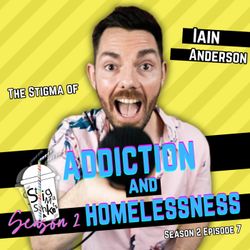
7. Even Rock Bottom Has a Basement: The Stigma of Addiction and Homelessness with Iain Anderson
01:09:40||Season 2, Ep. 7Iain Anderson is a Scottish comedian based in Barcelona. Since he exploded onto the Barcelona comedy scene last year, he has been making waves with his quick-wittedness, charisma and a lethal turn of phrase. He recently returned from the Edinburgh Fringe after completing a full run of his amazing debut one-man show TRAUMEDY: A Guide To Being A Fabulous Homeless Addict, which was a huge success and audiences praised it for being a clever blend of hilarious, moving and uplifting storytelling. He has been using this show as a vehicle to challenge people's ideas about homelessness and addiction and to rehumanise those who are currently impacted by it. DescriptionFrom the gay Glasgow scene to a bench in Barcelona, Iain Anderson found himself at rock bottom. Sadly, society places hefty stigmas and stereotypes surrounding addiction and homelessness, labelling those who find themselves waking up to this reality, “lazy, dirty, criminals. However, this is far from the case. New research has revealed that 45% of UK adults aged 18-75 have either directly experienced addiction themselves with a dependency to alcohol, drugs, medication, gambling or sex themselves. More than one in three people sleeping rough have been deliberately hit or kicked or experienced some other form of violence whilst homeless. Staggeringly, 80% of homeless people in England reported issues with their mental health, with 45% having been diagnosed with a mental health condition at some point in their lives. In this brutally honest episode, Iain explains how he found recovery, a warm bed, hope, and now through the power of comedy and storytelling, his soaring career as a comedian in his debut one-man show TRAUMEDY: A Guide To Being A Fabulous Homeless Addict. In this episode, Iain and Ally discuss:Why comedy is the perfect vehicle to expose trauma and tragedyThe stigmas or stereotypes surrounding addiction and homelessness What life is like living on the streets through a homeless lensHow to find recovery from addiction Why judgement is the last hand-out a homeless person or addict needs Living life sober The power of recovery, purpose, acceptance, and hope through the comedic genreFollow: For more about Iain @iananderson.comedy and @traumedyshowIf you love this episode, please share and leave a review — let’s smoke out stigma and make truth-telling the next biggest trend.
6. Behind Closed Doors: The Stigma of Domestic Violence with Jennie Girado
51:30||Season 2, Ep. 6Jennie Girardo is an award-winning director and producer with hundreds of behind-the-scenes, social, and branded content efforts under her belt. She’s created content for Apple TV’s Masters of the Air, Amazon Prime's Mr. And Mrs. Smith, and HBO's Game of Thrones and more. In 2024, Jennie made her narrative directorial debut with short film The Fuscos, which touches on the subject of domestic violence. She hopes that this film will help encourage women to use their voices to rise above the taboo, share their stories, and ultimately put an end to this epidemic. In her free time, you can find Jennie hiking in the mountains of California with her beloved four-legged children, Monte Carlo and Hudson.Episode Description: Domestic abuse (sometimes called 'domestic violence' or 'intimate partner violence') is an incident or a pattern of behaviour that is used by someone to control or obtain power over their partner or ex-partner. It is never the fault of the person who is experiencing it, and it is a crime. An equal act of domestic abuse can also be known as emotional abuse, which includes non-physical behaviours that are meant to control, isolate, or frighten you. This may present in romantic relationships as threats, insults, constant monitoring, excessive jealousy, manipulation, humiliation, intimidation, and dismissiveness, among others. Alarmingly, the stats pointing to domestic abuse remine rife and incomprehensible. In this honest, insightful and sensitive chat, together, Jennie and Ally share their personal experiences of domestic abuse and the ways, stages, and courageous steps they took to escape and heal from it. In this episode, Jennie and Ally discuss:The varying forms of domestic abuse The links between domestic violence and myths surrounding domestic violence leading to isolating stigmasHow to spot the red flags of domestic abuseFinding the power to speak up and speak outDiscovering the courage to walk away from domestic abuseHow the public and judicial system perceive domestic abuseThe impact of domestic abuse trauma and living a new lifeFollow: For more about Jennie and a portfolio of her work, visit: www.jenniecreates.coPersonal IG: @jenniecreatescoMonte and Hudson's IG: @monteandhudsonThe Fusco's IG: @thefuscosfilmIf you love this episode, please share and leave a review — let’s smoke out stigma and make truth-telling the next biggest trend.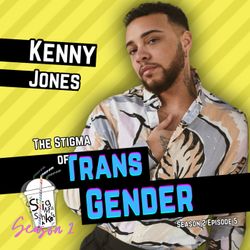
5. “Believe Me”: The Stigma of Transgender with Kenny Ethan Jones
56:51||Season 2, Ep. 5Kenny Ethan Jones is a writer and activist that is widely recognised for making history by being the first trans man to front a period campaign. Since then he's gone on to campaign about menstruation, body politics, mental health and intimacy. He engages in open, honest and respectful conversations about all things trans in hopes of tackling misinformation and creating allies. His debut novel Dear Cisgender People: A Guide to Trans Allyship and Empathy is due for release in June 2024.Episode DescriptionIn this profoundly important and moving episode, Kenny and Ally discuss the struggles and discrimination faced by the transgender community, including hate crimes and the trans community being used as “scapegoats” within media. Kenny shares his personal journey of realising he was transgender and the difficulties he faced in an all-girls school. Undoubtedly, the transgender community remains at the forefront of conversations, and yet, their experiences are often grossly misunderstood and discriminative. With his upcoming autobiography release, 'Dear Cisgender People’, hitting the bookshelves in June 2024, Kenny offers a brief and exclusive reading from the introduction of his literary masterpiece, leaving host Ally in “happy and proud” floods of tears. In this episode, Kenny and Ally discuss:The role of a transgender activistWhat does transgender really mean?How the transgender community faces discrimination and hate dailyWhy transgender individuals should be believed and supported in their identity.How gender dysphoria is a deep-felt knowingWhy we need to address transgender people in sport, sooner rather than laterThe misconceptions about puberty-blockersHow mainstream media portrays the transgender community Follow: You can find Kenny Ethan Jones via IG: @kennyethanjonesOrder your copy of Kenny's Autobiography, 'Dear Cisgender People', here.If you love this episode, please share and leave a review — let’s smoke out stigma and make truth-telling the next biggest trend.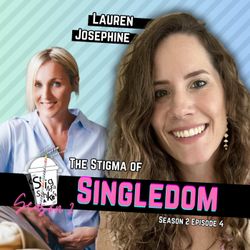
4. The Swipe Right Effect: The Stigma of "Singledom" with Lauren Josephine
52:01||Season 2, Ep. 4Lauren Josephine is long-time dater, turned dating and relationships author. After going on over 200 dates throughout her 20s and 30s, she felt called to write about and normalise all of the struggles modern daters deal with today, especially when using dating apps. She recently published her first book called ‘Looking for Something Serious', in which she uses her 10-year dating journey to discuss the many pitfalls of dating today, like ghosting, situationships, repeated rejection, and losing hope in dating altogether. Lauren is passionate about sharing practical, optimistic dating advice to help single people build the confidence, patience, and hope they need to not give up on finding love. She is 34 and lives in San Francisco with her fiancé (who she met on Reddit in 2022!) and her dog Winnie.Episode Description:In this “rom-com meets reality-check convo", Lauren and Ally discuss various aspects of dating, including online dating, the romantic personas people take on, and the challenges of modern dating. Let’s be honest, navigating dating apps is no easy feat! In this candid and light-hearted chat, Lauren shares the importance of taking responsibility for dating patterns, and the liminal timeline of grief, post breakup. Importantly, Lauren emphasises the need to give yourself permission to feel and normalise the emotions that come with dating dilemmas and relationships, and how there is no ‘one-size-fits-all' method when it comes to matters of the heart In our modern day world, we have access to “instant everything”, however a scarcity mindset and impulsive swiping is not a “fix” for the faint-hearted. So, most importantly, Lauren and Ally question, “can love be found beyond the digital landscape?” We’ll let you decide! In this episode, Lauren and Ally discuss:Why situationships rarely end well and… how to avoid them!Singledom: Dating app fails or liberation at last? The “guy” who forgot he dated you… #truestory Dating app sagas; the good, the bad, and the down-right cringe! Swipe right, swipe left; the “easy come-easy go” mindset, that is taking the dating world by storm! How to tackle past insecurities in present day dating, and the communication techniques to make the shift Why normalising emotional experiences in dating is a game-changer in love Red flags, boundaries and “BS” bravado: How to detoxify the dating game Follow Lauren: You can find Lauren Josephine via IG: @lookingforsomethingseriousPurchase Lauren Josephine’s book, ‘Looking for Something Serious: Stories, Laughs, and Lessons from a Decade of Online Dating’ here!If you love this episode, please share and leave a review — let’s smoke out stigma and make truth-telling the next biggest trend.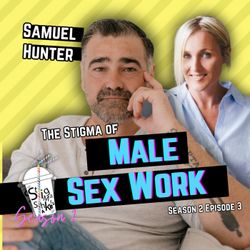
3. The Pleasure Portfolio: The Stigma of Male Sex work with Samuel Hunter
33:05||Season 2, Ep. 3Samuel Hunter, from Sydney Australia, has been working as a sex worker for the last four years. While admitting he's held dozens of different jobs, including working as a chef, working for a sex shop and writing blogs for a brothel, his interest in sex work began when he heard about a charity called Touching Base, that put people with disability in touch with sex workers. Now one of Australia’s most high-profile male sex workers, Samuel sees women from all walks of life, generally aged 50+, with some in their thirties and twenties on occasion. As a mature gent, both charming and cheeky in equal measure, Sam is generally booked out for three months, but with some dates booked out twice as long as that. He is passionate in all facets of his life, including creative outlets such as writing, volunteer work and of course, in the arms of his clients. Surviving a near fatal motorcycle accident to lead him into this work, Samuel has been interviewed for SBS, Body & Soul magazine, the Kyle and Jackie O Show, among others, to talk about the ins and outs of his profession.Description: In this honest and provocative episode, Stigma Shakers speaks to Samuel Hunter, a male sex worker, who shares his experiences and insights into the sex industry. In this candid chat, Ally and Samuel discuss the stigma surrounding male sex work and how it differs from the stigma faced by female sex workers. Samuel also opens up about his personal journey into sex work, including the impact of a life-changing bike accident that triggered the desire for change! Throughout this conversation, Samuel highlights the importance of creating a safe and trusting environment for his clients, where not only are the needs and boundaries of his clients respected, but his in the process, too ! In addition to being one of Australia’s most high profile male escorts, Samuel is a passionate Author on a mission to debunk the taboos around sexual pleasure and disability. This episode digs deep, and flips sex work on it’s head… in all the best ways possible! Topics: In this episode, Ally and Samuel discuss:The three C's of sex work: conversation, cuddles and cunnilingus… or is it? How to access equal rights for pleasure and disabilityDo male sex workers face different stigmas compared to female sex workers?The reasons behind a career change, to offer sexual pleasure, intimacy and connection for a feeThe importance of boundaries both in and outside of the bedroomThe myths behind the life of a male escortThe stigma (and dilemma!) about paying for sex Follow: You can find Samuel via IG: @samuel_hunter_sydney , Samuel's Only Fans account here, Samuel’s website here!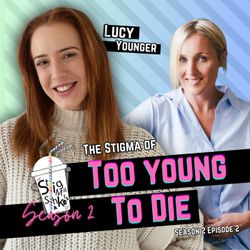
2. At What Point Do You Question Your Own Mortality?: The Stigma of Too Young to Die with Lucy Younger
45:26||Season 2, Ep. 2Lucy Younger is a 23-year-old young women’s health advocate and writer. After finishing her second year of university, she was diagnosed with a rare low grade brain tumour which required a craniotomy to treat. Post surgery and recovery, Lucy went on to graduate with an English degree, phenomenally followed by a Master's Degree, however similarly to her undergraduate experience, she was diagnosed with Thyroid cancer at the end of her master’s, which led her to start her blog and page “Living low grade”. This traumatic experience inspired Lucy to create an uplifting blog to raise awareness about low grade tumours, and cancer for young people who have just started their lives and courageously, learning to live with low grade tumours and a cancer diagnosis. As an admired social media advocate and influencer, Lucy’s TikToks have been featured in the New York post. These posts exist so that other young people in a similar position to Lucy, can watch and follow her journey. Now, Lucy raises awareness and advocates for both the Brain Tumour Charity and The British Thyroid Foundation along with writing a blog that has featured in regional newspapers to raise awareness for misdiagnosis of low-grade tumours of young people. Description: Receiving a cancer diagnosis is possibly one of the hardest and most confronting realities a person can face. Cancer remains devastatingly unbiased of who it targets, disrupting the lives of those diagnosed and the people around them. Tragically, the conversations around cancer and mortality are heavily weighted in fear and palpable overwhelm, altering the trajectory of a person’s life in a single heartbeat. One of the most confronting topics we face as a society and individually, is death. Yet, there is a marker when it comes to mortality; illness, age, and well… illness and age. There is a confronting stigma surrounding young people and death and a reluctance in talking about it. While some may look upon death as a natural stage of life, others may find the prospect of dying too terrifying to contemplate. So perhaps, let’s soften into the hard conversations and do mortality, meaning, and death differently.In this episode, Ally and Lucy discuss: How we can best listen, learn and support young people with cancerWhy talking about the value of life, mortality and death are not mutually exclusive How life can change in an instant, at any age Why death is as relevant a conversation as life is How seeking a diagnosis for health issues can be challenging for young people.Navigating mortality and an uncertain futureFollow: You can find Lucy via IG: @Lucy.younger, and livinglowgradee If you love this episode, please share and leave a review — let’s smoke out stigma and make truth-telling the next biggest trend.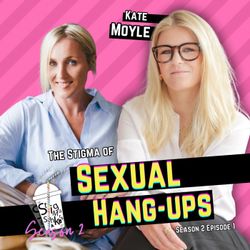
1. "The 237 Reasons Humans Have Sex": The Stigma of Sexual Hang-Ups
50:28||Season 2, Ep. 1Kate Moyle is a Psychosexual & Relationship Therapist, Certified Psycho-Sexologist, host of The Sexual Wellness Sessions Podcast and author of The Science Of Sex. In her psychotherapy practice she works with people to help them understand the challenges and difficulties that they are having in their sex lives and relationships, what's maintaining them and how they can get to a place of improved sexual wellbeing. She is a regular media contributor and expert on the topic of sexual wellbeing, and has been a guest on podcasts such as Diary Of A CEO hosted by Simon Barlett, Giovanna Fletcher's Happy Mum, Happy Baby, Grace Beverley's Working Hard, Hardly working and A Millennial Mind. She also consults for brands in the sexual wellness space and has worked with brands such as Headspace, This Works and Boots to launch products and ranges, and is UK expert for world-leading luxury pleasure brand Lelo.Description: Oh yes… sex and life is a complex duo! In this candid conversation, Ally and Kate discuss the importance of taking “sex talk” outside of the bedroom, leading to happier and healthier relationships. In this stigma shaking exposé, Ally and Kate Moyle discuss various aspects of sexual stigmas and how, when it comes to sex, society continues to raise its eyebrows in less than helpful ways. To normalise sex means to talk about sex, and the impact that sexual well-being has on our mental health. The topic of sex remains hugely taboo, with societal judgements sustaining unnecessary shame. Together, Ally and Kate tackle online censorship, the orgasm gap (including faking faux pas), the knock-on effect of stigma on women’s health, sex and disability, how sex is a skill that can be learned, and how everyone can be part of the hard conversations. This liberating episode exposes the sex topics unturned and most importantly, why sex is not a dirty word. Topics:In this episode, Ally and Kate discuss:The struggles we have with sex and communicationThe word ‘Vagina’ and the ongoing “ick” factor?How to introduce sexual boundariesHow to talk about sex outside of the bedroom Why sex is not a numbers game How to kick-start a stagnant sex life How to discover satisfaction, pleasure, and adaptability in a relationshipOnline censorship of sexual contentThe moral dilemmas when it comes to solo-play and porn The ordeals behind the orgasm gapWhy sex is nothing like the movies! Follow Kate: Kate Moyle Image Credit: © copyright Matt WrittleInstagram: @KateMoyleTherapyBook: https://www.waterstones.com/book/the-science-of-sex/kate-moyle/9780241593295Podcast: https://podcasts.apple.com/gb/podcast/the-sexual-wellness-sessions/id1527311547Website: www.katemoyle.co.uk
9. Putting Shame to Bed: The Stigma of the ‘V’ Word with Dr Aziza Sesay
29:55||Season 1, Ep. 9Dr. Aziza Sesay is an NHS General Practitioner, GP educator, Honorary Senior Clinical lecturer, host, speaker and health content creator. She has a strong passion for health education, awareness, advocacy and empowerment. She channels this through her platform ‘Talks with Dr. Sesay’ where she shares short informative videos, infographics, live discussions and tips on a variety of topics with a particular emphasis on women’s and gynaecological health, cancer awareness, mental health and health inequity. Dr. Sesay is the creative director of Black Female Doctors UK organisation, Charity fundraising lead for Keep it Fax charity, one of the Board of Directors of Prevention First Initiative, Ambassador for the Eve Appeal charity; and was a UN Women UK delegate for CSW 67 (volunteer role).She’s been featured on BBC News, Guardian, Metro News, Women’s health UK and many more. She’s a true believer in collaboration and has worked with many different organisations including NHS England, DHSC, CoppaFeel!, Jo’s Cervical Cancer Trust, Black Women Rising UK, PANDAS foundation. In addition, she has also supported several national public health campaigns.DescriptionWe are living in a digital era where we hold little back. Sex educators, influencers, activists and content creators are championing body parts by tackling taboo head on. Health practitioners and medical experts are taking to the virtual stage to normalise women’s health, in particular all things “down there”. But - this is being met with differing opinions. Not only do we need to understand our anatomy, but we need to be empowered by it. For many, shame is a familiar feeling when it comes to discussing medical conditions, so instead of muting our stories, it’s time we put shame to bed once and for all. And it starts here - by exposing the stigma of saying the word ‘vagina’, with the incredible Dr Aziza Sesay. Topics: In this episode, Ally and Aziza discuss:Dr Aziza Sesay's experience as an online medical influencer, and the challenges she faces!How can we tackle taboo online? Why we need to normalise body parts AKA, ‘vagina’How we can empower women to champion their health (and bodies!)The damaging side-effects of shadow-banning vital content What can we do as a community to combat censorship?Why are we so afraid to talk openly about women's health and 'things down there'?Follow: You can find Dr Aziza Sesay on Instagram @talkswithdrsesay @ via her website talkswithdrsesay.comIf you love this episode, please share and leave a review — let’s smoke out stigma and make truth-telling the next biggest trend.
loading...